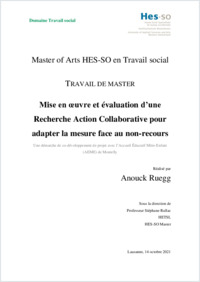Mise en oeuvre et évaluation d’une Recherche Action Collaborative pour adapter la mesure face au non-recours : Une démarche de co-développement de projet avec l’Accueil Éducatif Mère-Enfant (AEME) de Montelly : travail de Master
SONAR|HES-SO
- Ruegg, Anouck
- Rullac, Stéphane (Degree supervisor)
- Lausanne : HES-SO Master – travail social, 2021
Master of Arts HES-SO en Travail social: HES-SO Master – travail social, 2021
Travail social
Accueil Éducatif Mère-Enfant (AEME)
Projet
Non-recours
Innovation
Social work
Mother and child educational home
Project
Non-recourse
Innovation
English
French
This report describes the process of implementing an approach inspired by Collaborative Action Research with the idea of responding, or rather reacting to the following problem: “How does the inadequacy of support does it produce non-recourse and how can the service be adapted as part of a social innovation to better meet the current social needs of the potential accompanied persons?”. This approach was instituted as part of a cooperation between the Mother and child educational home of Montelly and the author of this document. It is based on a new representation of knowledge: “Everything that is done for me, without my user expertise, is done against my participation”. The writing begins with a presentation of the context of the approach, continues with the theories and concepts that supported the work, next the problem and research questions, then the methodological approach. Afterward the results and the discussion of the process are presented, concluding on the relevance of research for social work, and its limits and perspectives.
Ce rapport rend compte du processus de mise en oeuvre d’une démarche inspirée de la Recherche Action Collaborative (RAC) dans l’idée de répondre, ou plutôt de réagir à la problématique suivante : « Dans quelle mesure l’inadaptation de l’accompagnement produit-elle un non-recours et comment la prestation peut-elle être adaptée dans le cadre d’une innovation sociale pour mieux répondre aux besoins sociaux actuels des potentielles personnes accompagnées ? ». Cette démarche a été instituée dans le cadre d’une coopération entre l’Accueil Éducatif Mère-Enfant (AEME) de Montelly et l’auteure de ce document. Elle repose sur une nouvelle représentation du savoir : « Tout ce qui est fait pour moi, sans mon expertise usagère, est fait contre ma participation ». L’écrit débute avec une présentation du contexte de la démarche, se poursuit avec les théories et concepts qui ont soutenu le travail, pour rebondir sur la problématique et les questions de recherche, puis la démarche méthodologique. Ensuite sont présentés les résultats et la discussion du processus, pour conclure sur l’intérêt de la recherche pour le travail social, ainsi que ses limites et perspectives.
- Language
-
- French
- Classification
- Social work
- Notes
-
- HES-SO Master
- Domaine Travail social
- hesso:mats
- Persistent URL
- https://sonar.ch/global/documents/319554
Statistics
Document views: 245
File downloads:
- TM Ruegg_2021.pdf: 124
